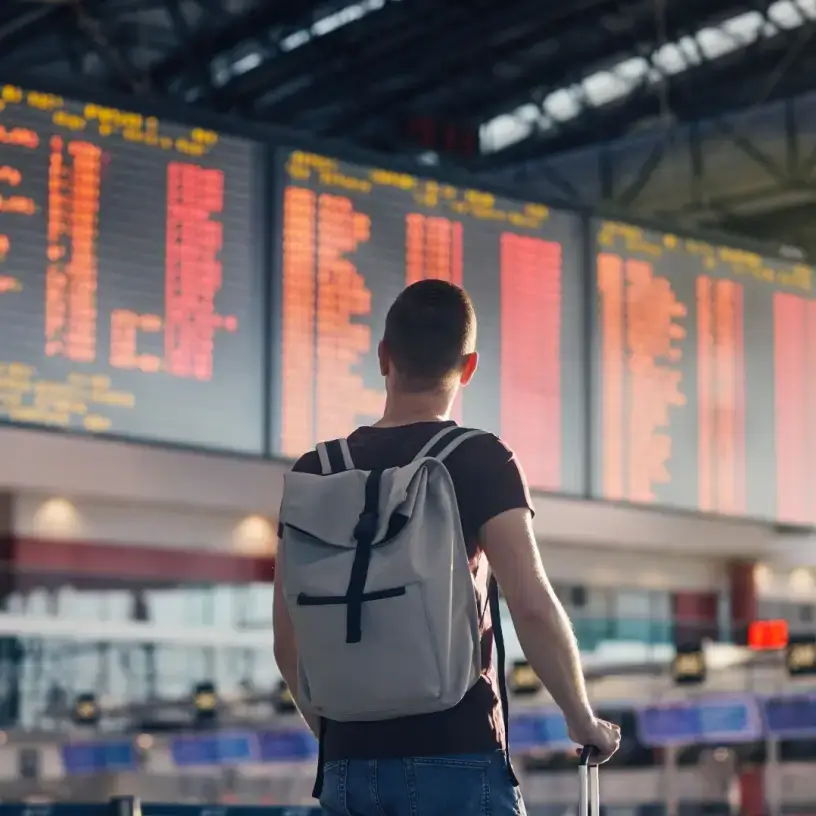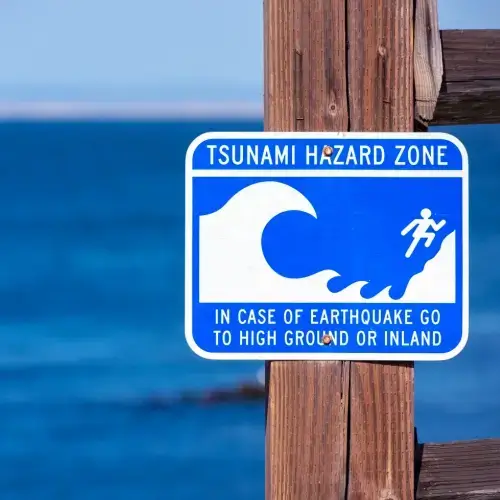Home / Compare Travel Insurance / Travel insurance that co…




Key takeaways
- You can’t always predict natural disasters so travel insurance may protect you financially if a natural disaster knocks your trip off-course.
- Natural disaster cover may offer reimbursement for emergency accommodation, cancellation of some or part of your trip and more.
- You may only be covered for natural disasters if you purchase your travel insurance policy before it’s considered a ‘known event.’
Does travel insurance cover natural disasters?
Many comprehensive travel insurance policies will provide cover for natural disaster-related losses, as long as you purchase your policy before a natural disaster occurs. In some cases, you might also have to pay an additional fee for travel insurance that covers natural disasters.
However, if you buy a policy after the natural disaster commences, your travel insurance will not cover you. This is because the natural disaster becomes a ‘known event’, and travel insurance is designed to cover you against unforeseen or unexpected events, not those that are known.
When travelling overseas to a potential natural disaster zone, comprehensive travel insurance could provide additional peace of mind, as these policies are likely to provide some level of cover for cancellation costs, emergency evacuation and medical expenses.
Cover will vary between insurers, so it’s important to read your Product Disclosure Statement (PDS) for all the inclusions and exclusions of your cover for natural disasters. Read the Target Market Determination (TMD) to check whether a policy is suitable for you and your needs. Also, keep up to date on Smartraveller for any warnings and advice relating to natural disaster zones.
Expert tips for choosing the right travel insurance with natural disaster cover
While you might be looking for natural disaster cover, there are other benefits you might want to consider when choosing a travel insurance policy. Compare the Market’s travel insurance expert, Adrian Taylor, has these tips to help you compare.

Consider what cover you need
Compare and purchase comprehensive travel insurance as soon as you make a booking and pay any deposits to ensure you have cancellation cover from the start should you need to cancel your trip. If you purchase cover after a natural disaster occurs, you won’t be covered for any losses.
Understand common policy exclusions
It’s important to understand the exclusions of your policy as travel insurance for natural disasters may differ between insurers. You should also heed any travel warnings; if you don’t, and you travel against government travel warnings, your insurer is unlikely to cover you for losses or damages.
Compare cover for your whole trip
While getting cover for natural disasters is important, that’s not all travel insurance covers. Consider what further cover you need for general medical expenses, cancellation fees, luggage and rental vehicle excess. Always read the PDS to make sure you have the cover you need.
Understanding travel insurance that covers natural disasters
Why get travel insurance that covers natural disasters?

You can’t always predict the weather; if disaster strikes, it can seriously impact your trip if one occurs near your travel destination. Having travel insurance in case of an unforeseen disaster may save you money if your trip gets cancelled or you become stranded overseas and need to pay for additional accommodation and flights.
Keep in mind that some travel insurance policies include cancellation cover as an optional extra which you must add to your policy when purchasing to be covered for cancellations. Some insurers may also offer travel insurance that covers cancellation cover for any reason, meaning you may be covered for reasons usually excluded, such as change of mind.
What should my travel insurance policy for natural disasters include?
When it comes to natural disasters and the damage they can cause, the following benefits are definitely something to look for in travel insurance policies:
- Medical costs and hospital expenses
- Trip cancellation and travel delays
- Emergency accommodation/flights
- 24/7 emergency assistance
- Luggage and personal effects
- Emergency medical evacuation and repatriation back to Australia.
Should you incur additional travel or accommodation if your plans change, you’ll need a policy with additional expense cover. Most comprehensive policies will include this in their cover but be aware that many standard and basic plans do not. Always check with your travel insurance company before paying for any additional accommodation or travel, so you know what your policy will cover.
Does travel insurance cover flights?
Travel insurance with natural disaster cover may offer some compensation for cancelled or delayed flights, depending on your insurer and your level of cover. Some examples of where a comprehensive policy may cover you include:
- You purchased your travel insurance before your trip and a natural disaster occurs unexpectedly at your destination before you leave, so your flights (any maybe the rest of your trip) need to be cancelled or you need to re-arrange your travel plans.
- You need to cancel your pre-paid flights and the rest of your trip because a natural disaster damaged your home or business in Australia within a certain period prior to your departure (e.g. 72 hours).
- A natural disaster delays your flights for more than 12 hours and you need to pay for emergency accommodation and other expenses.
Keep in mind that you can’t be reimbursed twice, so if your airline company has already fully compensated you, your claim may not be accepted. If your airline company only partially compensated you, you may be able to claim for the remaining amount.
Be aware that travel insurance typically doesn’t cover the cost of purchasing new flights; instead, it typically only covers some or all of the cost if you can’t make your pre-paid travel arrangements (e.g. due to a natural disaster).
What does travel insurance for natural disasters not cover?
As with all aspects of your travel insurance policy, your cover for natural disasters comes with limits and exclusions that may cause your claim to be rejected. Some common exclusions include:
- Ignoring travel warnings. If you travel to an area with an active ‘Do Not Travel’ government travel alert in place, you won’t be covered.
- Illegal or risky activities. If your claim is a result of you taking risks or breaking laws, it’s highly likely it will be rejected.
- Not contacting your insurer before changing plans. You may not be covered if you change your plans or pay for alternative flights and accommodation without first notifying your insurer.
- Bad weather. While it can be inconvenient, bad weather (e.g. constant rain on your beach holiday) is not covered by your policy unless it causes financial losses such as flight delays, lost tours or uninhabitable accommodation.
- Pre-existing medical conditions. If you don’t declare your pre-existing conditions or your insurer decides they aren’t able to cover them, you typically won’t have medical cover or cancellation cover for any related losses.
Before purchasing a policy, read the PDS for the full details of the exclusions, limits, sub-limits and more.
Types of natural disasters covered by travel insurance
There are different types of natural disasters that can be covered by your travel insurance policy and getting the right travel cover can help with the financial impact of a natural disaster disrupting your travel plans.
However, it’s important to understand that not all natural disasters may be covered as default under travel insurance; incidents like volcanic ash clouds and avalanches might require additional cover to be protected.
Natural disasters your policy may cover include:
- Earthquakes
- Floods
- Landslides and mudslides
- Tornadoes
- Tropical storms such as cyclones, hurricanes and typhoons
- Tsunamis
- Wildfires.
Tips on staying safe from natural disasters while travelling
1. Keep your documents in safe, water-repellent spaces
In the event you’re swept up in a storm or your accommodation is flooded, keeping your important documents (such as your passport) under wraps in water-repellent spaces to keep them safe is recommended. You might also want to protect any receipts, bank or credit card statements and boarding passes in case you need to make a claim.
2. Research your destination before travelling
By understanding the risks and potential natural disasters that may occur at your travel destination and creating an emergency plan, you’re able to enjoy your travels safely. Different locations will have different risks; for example, Bali, Indonesia is known for having floods, tsunamis and volcanic eruptions, while Japan frequently deals with earthquakes, all of which could impact your holiday. Keep an eye on the weather reports in your destination and consider taking out international travel insurance the minute you book your flight or cruise.
3. Choose your itinerary and accommodation with care
If you’re heading to an area where you think a natural disaster might occur, plan your activities and accommodation with safety in mind. Certain natural disasters are more common at different times of year depending on the location (e.g. typhoons are more likely in Vietnam from June to November1), so plan accordingly.
If you’re unsure, talk to a travel agent or the hotel staff in your location, or look it up online.
More on travel insurance for natural disasters
What would happen if I’m caught overseas during a natural disaster?
First, stay calm and try to move to a safe place to seek shelter or medical treatment. Secondly, contact your travel insurer if you need assistance. You can also ring the Consular Emergency Centre from anywhere in the world on +61 2 6261 3305, and they’ll be able to direct you to the nearest English-speaking hospital and contact your family and friends on your behalf.
Does travel insurance cover volcanic eruptions?
It is possible to get cover for volcanic ash clouds with travel insurance; it may come automatically with your cover for natural disasters, depending on your insurer and policy. However, if it isn’t included, you may need to purchase volcanic ash cloud cover as an additional extra.
Does travel insurance cover avalanches?
Travel insurance may cover avalanches, but typically not under a standard insurance policy. So if you planning on travelling to the snow, you may need additional winter sports cover to be insured for losses or damages from on-piste related incidents.
Winter sports cover can also cover you for injuries on-piste, medical evacuation from the slopes, damaged or stolen ski gear and unused passes if the ski slope is closed unexpectedly.
Does travel insurance cover hurricanes and cyclones?
Your travel insurance may cover hurricanes and cyclones if your policy either automatically covers natural disasters or you’ve purchased natural disaster cover as an optional extra. You’ll also need to have purchased your travel insurance before the storm became a known event.
Does travel insurance cover wildfires?
Wildfires may be covered by your travel insurance policy, if you purchased your travel insurance before the natural disaster became a known event threatening your trip. If your destination is in danger of a wildfire, make sure to follow advice from the local government authorities and evacuate if necessary.
You may be covered for emergency accommodation, trip cancellation costs, medical expenses and the cost of repairing or replacing your luggage and personal effects.
Meet our travel insurance expert, Adrian Taylor
As a General Insurance expert with over 13 years’ experience in financial services, Adrian Taylor believes in educating customers about the importance of travel insurance so that anyone can kick back and make the most of their time away from home. While no one wants a disrupted holiday, a suitable travel insurance policy can provide a financial safety net for yourself, your belongings and your trip in case things go wrong.
Want to know more about travel insurance?
1 Smartraveller – Australian Government. Vietnam. Information current as of May 2025. Accessed May 2025.

